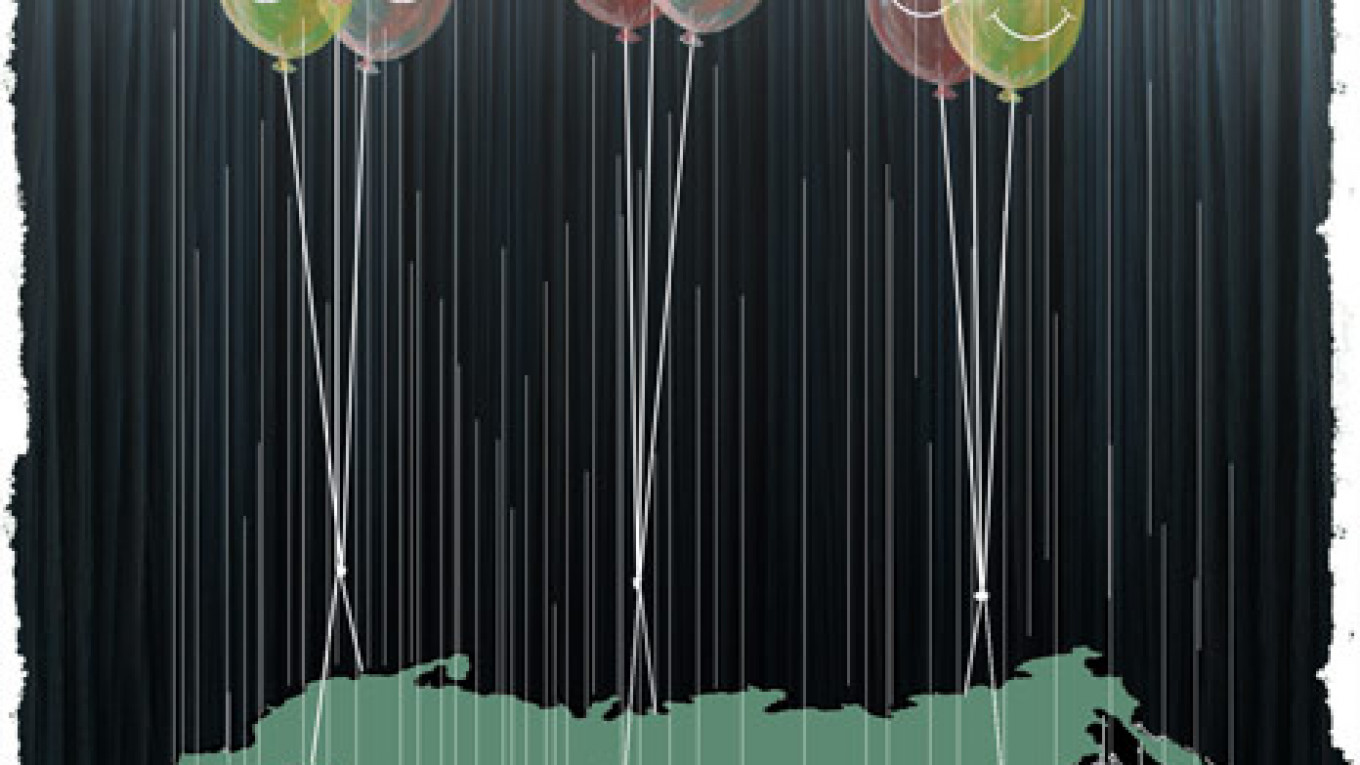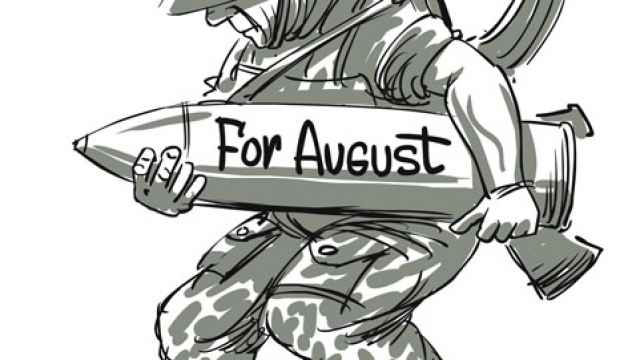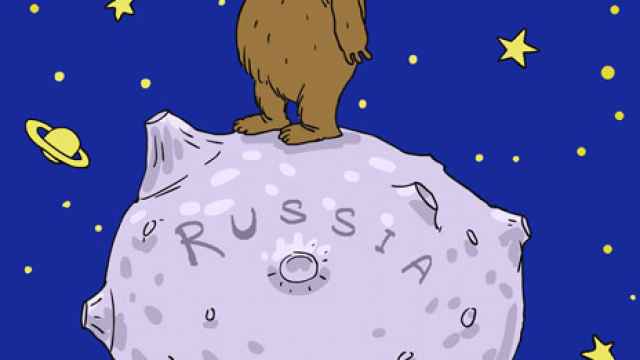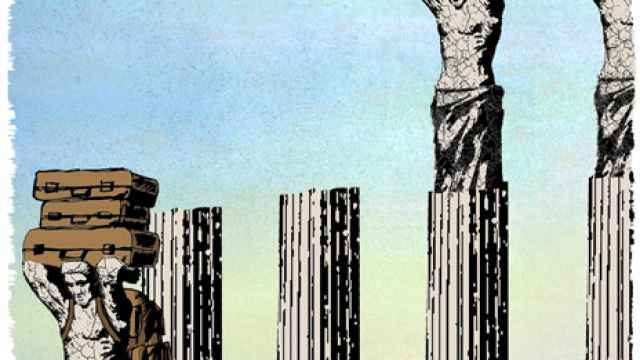Even while senior officials try to comfort television viewers by claiming that the Russian economy has already hit bottom and is moving toward recovery, the rolling captions at the bottom of the screen that show the ruble's continuing decline tell a very different story.
The ruble is once again approaching the record low it hit in the middle of last winter. The refinancing of banks — one of the main causes of the ruble's collapse back then — is an imminent concern. The average Russian now has less buying power and purchases fewer foods and of lower quality than before.
Clumsy apocalyptic propaganda reports of tractors crushing banned foreign cheese imports only serve to show how quickly the rules of supply and demand can change in Russia. That new reality hits home when shoppers find only Russian cheeses with unpleasant flavors and textures in place of their favorite imported brands on market shelves — the result of the government's acclaimed program of "import substitution."
Worse, that example illustrates how quickly the same could happen to home electronics, automobiles and even medicines. Unlike a block of cheese or the latest iPhone, having access to the right medicines can mean the difference between life and death.
Today, those medicines remain available on pharmacy shelves and those who need them can hold onto life. But tomorrow this or that sanction could remove them from the Russian market or the ruble's sharp fall could make them too costly — with the result that people die. There is no mechanism in place to prevent that scenario from playing out. There is no "bottom" to hit.
Limiting imports really could spur domestic production. If, for example, Russia has been unable to produce suitable medicines to combat high blood pressure, or if the imported variety has become too expensive for the domestic market, why not produce them here?
But to do that, the government would have to place a major order for the meds and offer tax breaks and other incentives to Russian producers — and do so before a ban takes effect and leaves hundreds of thousands, and possibly millions of people who are dependent on those drugs face to face with death.
Unfortunately, that approach is virtually impossible. North Korea offers the only example of a closed economy in the modern world. Russians are accustomed to believing that several layers of checks and balances are in place to prevent this country from degenerating into another North Korea.
But it turns out that it takes little effort for leaders to remove those protections altogether. That is exactly what is happening now, and it would take systemic reforms to reverse the trend.
What would happen if the current — or even the next — Kremlin administration suddenly reversed course on Ukraine? The West would probably end or ease its current sanctions and imports of foreign products would resume, eliminating the need to artificially ramp up domestic production.
However, that alone might not prompt investors to return to Russia. The great sums of money that have fled Russia in recent months will return only when clearly defined and fair rules of the game are in place. It is not enough for a Russian president to simply declare a change in foreign policy and military priorities. Russia would also need an independent judicial system and a different system of government.
But who will form that other system?
Those who are currently in power, regardless of their job title, have no interest in reform. And if they do bring in an "architect of reform," that person would quickly conclude that he must fire his own boss to make any progress. Instead, he would lose his own job.
To carry out the painful reorganization of the current system of government — and to possibly imprison those who abused their positions of power to create and maintain that system over the last 20 years — would require a charismatic politician even more ambitious than former President Boris Yeltsin.
Although Yeltsin managed to harbor and protect what he believed was the reformist cabinet of former Prime Minister Yegor Gaidar for several months, he ultimately buckled under pressure. Is anyone of that magnitude evident now on the political horizon?
Perhaps such a person already walks the corridors of the Kremlin or White House. If so, it will come as a great surprise to everyone when he suddenly takes center stage. There is no way to even imagine what political program that person might have, the names of his like-minded associates or what form of political system he envisions creating.
And, of course, that arrangement offers not even a hint of democratic elections between public candidates with clearly defined political platforms. This is more like blind faith: you can choose to believe or not believe that such a person exists. And both options give little hope of a better future.
What about the opposition? In fact, there is no organized opposition in modern Russia. Yes, there are several truly talented and hard-working opposition figures whom the authorities have managed to marginalize politically and keep out of the mass media and there is a rather long list of people who have, at different periods, personified the acme of the Russian democratic movement.
Unfortunately, both groups commit the mistake of overestimating their own importance and potential by failing to recognize that the ruling regime has successfully cast them as practically the main enemies of the state. Their belief that they can influence public opinion simply by changing the content of Russia's two largest national television channels makes them seem less like opponents of the ruling regime and more like adepts of the current system.
As for Russia's so-called "think tanks" or research centers, most people who were serious about analyzing the situation in the country and recommending a remedy have been forced to emigrate or switch professions. Those centers are now staffed by individuals who began their careers during the final years of the Soviet Union and hit their stride in the 1990s and 2000s when their top priority was to attract government funding and take expensive trips abroad.
These are precisely the people who, when the order comes to draft reforms to the system, will gladly pocket the money while politely refraining from telling the Kremlin that its policies are the main source of the current problems.
And yet, a new system will eventually emerge, if for no other reason than the current one so obviously does not work anymore.
The resignation of former Russian Railways head Vladimir Yakunin made headlines in recent days and probably does indicate a reshuffling within the powerful inner circle of the ruling elite — an intensifying "backroom scuffle among bulldogs" as some observers have termed it. And while that skirmish might destabilize the current system to some extent, it does nothing to shed light on what future awaits this country.
The Russian people have no idea toward which port the ship of state is sailing, much less whether it is a worthwhile destination. This is a fairly typical situation for the so-called "post-Soviet period of transition" — a condition in which both the point of origin and the ultimate destination remain obscure.
Ivan Sukhov is a journalist who has covered conflicts in Russia and the CIS for the past 15 years.
A Message from The Moscow Times:
Dear readers,
We are facing unprecedented challenges. Russia's Prosecutor General's Office has designated The Moscow Times as an "undesirable" organization, criminalizing our work and putting our staff at risk of prosecution. This follows our earlier unjust labeling as a "foreign agent."
These actions are direct attempts to silence independent journalism in Russia. The authorities claim our work "discredits the decisions of the Russian leadership." We see things differently: we strive to provide accurate, unbiased reporting on Russia.
We, the journalists of The Moscow Times, refuse to be silenced. But to continue our work, we need your help.
Your support, no matter how small, makes a world of difference. If you can, please support us monthly starting from just $2. It's quick to set up, and every contribution makes a significant impact.
By supporting The Moscow Times, you're defending open, independent journalism in the face of repression. Thank you for standing with us.
Remind me later.






